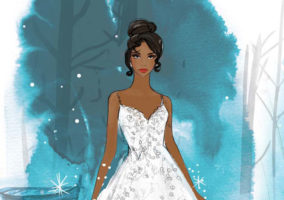
A very REDRUM CHRISTMAS to you all, darlings!
Hey, don’t blame us. We’re here to give you a slice of the zeitgeist filtered through our own impeccable taste. We can’t help it if the zeitgeist is all murder trees at the moment. Thankfully – or perhaps wisely – we included plenty of other topics of discussion to tide you over until Monday, when we triumphantly return to your lives, full of opinions and carbs. Have a fabulous one, dolls!
Here’s your soundtrack for this post: the just-released star-studded video for Ariana Grande’s INCREDIBLY hyped “Thank U, Next.”
Fueled by endorsements from Carey and Padma Lakshmi, who also starred in the movie, and a Change.org petition demanding that streaming services finally offer it, the album reached No. 1 on iTunes and reëmerged on several Billboard charts. The soundtrack achieved an improbable ten-thousand-per-cent increase in sales—driven almost entirely by digital-album downloads. The “Glitter” campaign has done more than exhume a notorious dud, however: it has provided a moment to pause and reëvaluate how we listen to music in the streaming era.
The #JusticeForGlitter Campaign Rescues a Mariah Carey Dud by Paula Mejia at the New Yorker
This character type has been so irresistible to some white moviegoers for half a century that it’s little wonder Green Book’s distributor Universal assumed it would work again. A white main character in a story about racism can himself be racist (as Steiger’s character is in Heat of the Night) or old-school and gruff (as Gene Hackman’s ex-sheriff is in 1988’s Mississippi Burning) or prone to making offensive jokes (as Jeff Bridges’s lawman does in 2016’s Hell or High Water) as long as fundamentally he’s a good guy. And there’s just as long a tradition, from the television series I Spy (which premiered just a few years after Green Book is set) to 48 Hrs. and beyond, of black-white partnership comedies in which the two heroes need each other to be complete.
Who Was Green Book For? by Mark Harris at Vulture
You’ve surely seen the selburose before, too: It’s knit into sweaters, featured on those mittens, seen at the Olympics, and printed on leggings and drink cozies. It’s shorthand for Scandinavia, if not Norway specifically, and feels at home on winter gear, especially our American faux-Christmas sweaters and earmuffs. Norwegians love it—especially on the famous black-and-white mittens my grandmother used to make. The symbol is one of that country’s proudest cultural exports, thanks to the knitwear on which it is most often emblazoned.
The Star of Norwegian Knitwear by Emma Sarappo at The Atlantic
At the time of the movie’s release and for years later, even people who wouldn’t go near Last Tango heard, and talked and joked about, the sequence in which Brando’s character uses butter as a lubricant before penetrating Jeanne from behind. She is unwilling; the act is a rape, and although Jeanne seems somewhat equanimous after the fact, this brutal event is the story’s turning point—and the point at which it becomes clear that her power is greater. The unchecked machismo of Brando’s character, the very thing that allows him to take Jeanne with such ease and barbarity, is the most visible symptom of his weakness. He’s the embodiment of Tammy Wynette’s famous, withering line, “After all, he’s just a man.”
How Should We Look at Bertolucci’s Films Now That He’s Gone? by Stephanie Zacharek at Time
As mentioned above, Prada is all about family. After she completed her PhD in political sciences, Miuccia took over the family business and transformed into a global mega brand and a £2.8 billion global business. The same year she and her siblings Albert and Marina inherited the company, Miuccia met the love of her life, Patrizio Bertelli, who ran a luxury leather company at the time and would later become her husband and Prada Group co-CEO. The marriage of Miuccia’s design prowess and Bertelli’s acumen with production, logistics and more is a fruitful one. It was Bertelli who encouraged her to design clothes as well as bags, threatening to hire someone else if she didn’t, and thankfully for us she took up the challenge and changed fashion forever.
The A-Z of Miuccia Prada by Steve Salter at Vice
Say, for example, you once “liked” the official Facebook page of a brand like Nike, Armani, or Louis Vuitton. You may have done so mindlessly—perhaps encouraged by Facebook to illustrate your interests on your profile, or simply to keep up with their posts. But to Cambridge Analytica, those “likes” spoke volumes about your personal character—enough, anyway, to decide whether or not to send political propaganda your way or give you up as a bad job.
Cambridge Analytica Used Fashion Propaganda in its Pro-Trump Election Strategy by Stephanie Eckardt at W Magazine
I was a movie-struck kid, and I learned much from watching the screen, including things about men and women that I later had to unlearn or learn to ignore. I learned that women needed to be protected, controlled and left at home.
What the Movies Taught Me About Being a Woman by Manohla Dargis at The New York Times
“Everybody has a different taste,” Melania Trump said this week. Speaking at a town hall conversation at Liberty University, the first lady was referring to her White House Christmas decorations, which were unveiled in a short video on Monday, and the kerfuffle they caused. Particularly the red topiary trees lining the East Colonnade. The entire nation has come to know the phrase “blood red,” as it became the stuff of late-night monologues.
There Will Be Blood-Red Trees by Steven Kurutz at The New York Times
Shedding the wild outfits and wigs, the actress has been bringing her A-game since she first floated up to the Venice Film Festival, with help from her stylist duo: “We wanted to channel old Hollywood glamour but also let her be,” the pair say of one recent look.
So Long, Meat Dress! Why Lady Gaga Is Going All Glam for Her ‘Star Is Born’ Red Carpet Looks by Lindsay Weinberg at The Hollywood Reporter
Wearing black helped one writer deal with anxiety. And then it became a source of anxiety itself.
The Anxiety of the Minimalist Closet by Tyler Watamanuk at GQ
You’ve heard the adage “Be the change you wish to see in the world?” Well, this year women really took that to heart: A record 257 women won nominations for Congress, female artists topped charts and snagged landmark Emmy nods, and many women spoke out about sexual harassment, gun violence, and injustices—proving time and again that our voices are too strong to be silenced. Ahead, the 51 most inspiring/motivating/pride-inducing female milestones that occurred in 2018.
The 51 Most Powerful Moments for Women in 2018 by Kayla Webley Adler at Marie Claire
“I’m really ashamed and embarrassed with the things I said. I can’t turn back time but if I could, I would. And I’m so sorry to whoever I hurt and whoever I lied about because it truly eats away at me. It makes me feel so horrible and sick to my stomach and sad,” Bynes says. “Everything I worked my whole life to achieve, I kind of ruined it all through Twitter.” But, she adds, “it’s definitely not Twitter’s fault — it’s my own fault.”
Break the Internet: Amanda, Please by Abby Schreiber at Paper
The Testaments is set 15 years after Offred’s final scene in The Handmaid’s Tale and will be narrated by three female characters. “Dear Readers: Everything you’ve ever asked me about Gilead and its inner workings is the inspiration for this book,” Atwood said in a statement. “Well, almost everything! The other inspiration is the world we’ve been living in.”
Margaret Atwood to publish sequel to The Handmaid’s Tale in 2019 by Jessica Derschowitz at EW
[Photo Credit: INSTARImages]
Friday Leftovers for the Week of November 25th, 2018 Next Post:
Michelle Obama in Adeam at her “Becoming” NYC Book Tour
Please review our Community Guidelines before posting a comment. Thank you!



